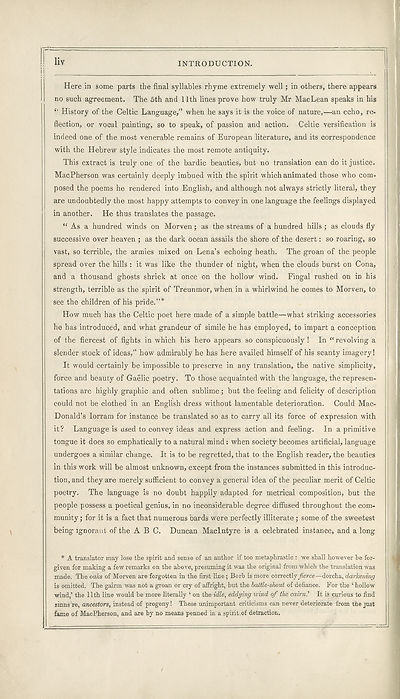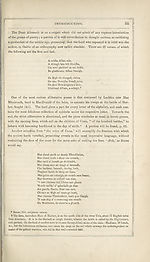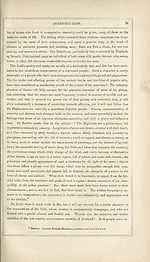Books and other items printed in Gaelic from 1871 to 1900 > Sar-obair nam bard Gaelach, or, The beauties of Gaelic poetry, and lives of the Highland bards
(66) Page liv
Download files
Complete book:
Individual page:
Thumbnail gallery: Grid view | List view

INTRODUCTION.
jj
Here in some parts the final syllables rhyme extremely well; in others, there appears
no such agreement. The 5th and 11th lines prove how truly Mr MacLean speaks in his
“ History of the Celtic Language," when he says it is the voice of nature,—an echo, re¬
flection, or vocal painting, so to speak, of passion and action. Celtic versification is
indeed one of the most venerable remains of European literature, and its correspondence
with the Hebrew style indicates the most remote antiquity.
This extract is truly one of the bardic beauties, but no translation can do it justice.
MacPherson was certainly deeply imbued with the spirit which animated those who com¬
posed the poems he rendered into English, and although not always strictly literal, they
are undoubtedly the most happy attempts to convey in one language the feelings displayed
in another. He thus translates the passage.
“ As a hundred winds on Morven; as the streams of a hundred hills ; as clouds fly
successive over heaven ; as the dark ocean assails the shore of the desert: so roaring, so
vast, so terrible, the armies mixed on Lena’s echoing heath. The groan of the people
spread over the hills : it was like the thunder of night, when the clouds burst on Cona,
and a thousand ghosts shriek at once on the hollow' wind. Fingal rushed on in his
strength, terrible as the spirit of Treunmor, when in a whirlwind he comes to Morven, to
see the children of his pride.”*
How much has the Celtic poet here made of a simple battle—what striking accessories
he has introduced, and what grandeur of simile he has employed, to impart a conception
of the fiercest of fights in which his hero appears so conspicuously! In “ revolving a
slender stock of ideas,” how admirably he has here availed himself of his scanty imagery!
It would certainly be impossible to preserve in any translation, the native simplicity,
force and beauty of Gaelic poetry. To those acquainted with the language, the represen¬
tations are highly graphic and often sublime; but the feeling and felicity of description
could not be clothed in an English dress without lamentable deterioration. Could Mac¬
Donald’s lorram for instance be translated so as to carry all its force of expression with
it? Language is used to convey ideas and express action and feeling. In a primitive
tongue it does so emphatically to a natural mind: when society becomes artificial, language
undergoes a similar change. It is to be regretted, that to the English reader, the beauties
in this work will be almost unknown, except from the instances submitted in this introduc¬
tion, and they are merely sufficient to convey a general idea of the peculiar merit of Celtic
poetry. The language is no doubt happily adapted for metrical composition, but the
people possess a poetical genius, in no inconsiderable degree diffused throughout the com¬
munity ; for it is a fact that numerous bards were perfectly illiterate ; some of the sweetest
being ignorant of the ABC. Duncan MacIntyre is a celebrated instance, and a long
* A translator may lose the spirit and sense of an author if too metaphrastic : we shall however he for¬
given for making a few remarks on the above, presuming it was the original from which the translation was
made. The oaks of Morven are forgotten in the first line; Borh is more correctly fierce—dorcha, darkening
is omitted. The gairm was not a groan or cry of affright, hut the battle-shout of defiance. For the ‘ hollow
wind,’ the 11th line would be more literally ‘ on the idle, eddying wind of the cairn.' It is curious to find
sinns’re, ancestors, instead of progeny! These unimportant criticisms can never deteriorate from the just
fame of MacPherson, and are by no means penned in a spirit of detraction.
jj
Here in some parts the final syllables rhyme extremely well; in others, there appears
no such agreement. The 5th and 11th lines prove how truly Mr MacLean speaks in his
“ History of the Celtic Language," when he says it is the voice of nature,—an echo, re¬
flection, or vocal painting, so to speak, of passion and action. Celtic versification is
indeed one of the most venerable remains of European literature, and its correspondence
with the Hebrew style indicates the most remote antiquity.
This extract is truly one of the bardic beauties, but no translation can do it justice.
MacPherson was certainly deeply imbued with the spirit which animated those who com¬
posed the poems he rendered into English, and although not always strictly literal, they
are undoubtedly the most happy attempts to convey in one language the feelings displayed
in another. He thus translates the passage.
“ As a hundred winds on Morven; as the streams of a hundred hills ; as clouds fly
successive over heaven ; as the dark ocean assails the shore of the desert: so roaring, so
vast, so terrible, the armies mixed on Lena’s echoing heath. The groan of the people
spread over the hills : it was like the thunder of night, when the clouds burst on Cona,
and a thousand ghosts shriek at once on the hollow' wind. Fingal rushed on in his
strength, terrible as the spirit of Treunmor, when in a whirlwind he comes to Morven, to
see the children of his pride.”*
How much has the Celtic poet here made of a simple battle—what striking accessories
he has introduced, and what grandeur of simile he has employed, to impart a conception
of the fiercest of fights in which his hero appears so conspicuously! In “ revolving a
slender stock of ideas,” how admirably he has here availed himself of his scanty imagery!
It would certainly be impossible to preserve in any translation, the native simplicity,
force and beauty of Gaelic poetry. To those acquainted with the language, the represen¬
tations are highly graphic and often sublime; but the feeling and felicity of description
could not be clothed in an English dress without lamentable deterioration. Could Mac¬
Donald’s lorram for instance be translated so as to carry all its force of expression with
it? Language is used to convey ideas and express action and feeling. In a primitive
tongue it does so emphatically to a natural mind: when society becomes artificial, language
undergoes a similar change. It is to be regretted, that to the English reader, the beauties
in this work will be almost unknown, except from the instances submitted in this introduc¬
tion, and they are merely sufficient to convey a general idea of the peculiar merit of Celtic
poetry. The language is no doubt happily adapted for metrical composition, but the
people possess a poetical genius, in no inconsiderable degree diffused throughout the com¬
munity ; for it is a fact that numerous bards were perfectly illiterate ; some of the sweetest
being ignorant of the ABC. Duncan MacIntyre is a celebrated instance, and a long
* A translator may lose the spirit and sense of an author if too metaphrastic : we shall however he for¬
given for making a few remarks on the above, presuming it was the original from which the translation was
made. The oaks of Morven are forgotten in the first line; Borh is more correctly fierce—dorcha, darkening
is omitted. The gairm was not a groan or cry of affright, hut the battle-shout of defiance. For the ‘ hollow
wind,’ the 11th line would be more literally ‘ on the idle, eddying wind of the cairn.' It is curious to find
sinns’re, ancestors, instead of progeny! These unimportant criticisms can never deteriorate from the just
fame of MacPherson, and are by no means penned in a spirit of detraction.
Set display mode to:
![]() Universal Viewer |
Universal Viewer | ![]() Mirador |
Large image | Transcription
Mirador |
Large image | Transcription
Images and transcriptions on this page, including medium image downloads, may be used under the Creative Commons Attribution 4.0 International Licence unless otherwise stated. ![]()
| Permanent URL | https://digital.nls.uk/109809865 |
|---|
| Description | Out-of-copyright books printed in Gaelic between 1631 and 1900. Also some pamphlets and chapbooks. Includes poetry and songs, religious books such as catechisms and hymns, and different editions of the Bible and the Psalms. Also includes the second book ever published in Gaelic in 1631. |
|---|

